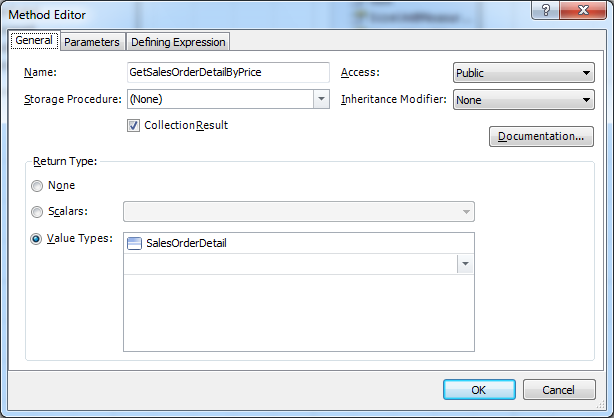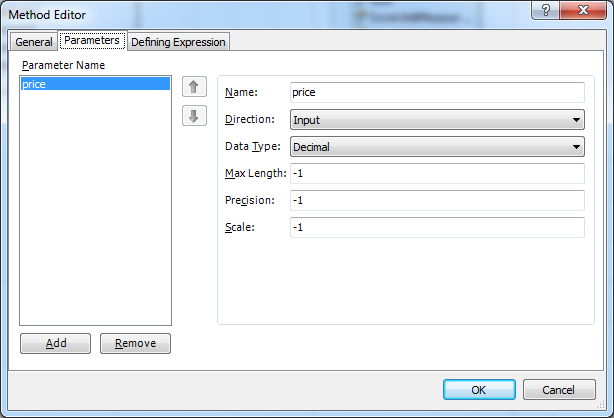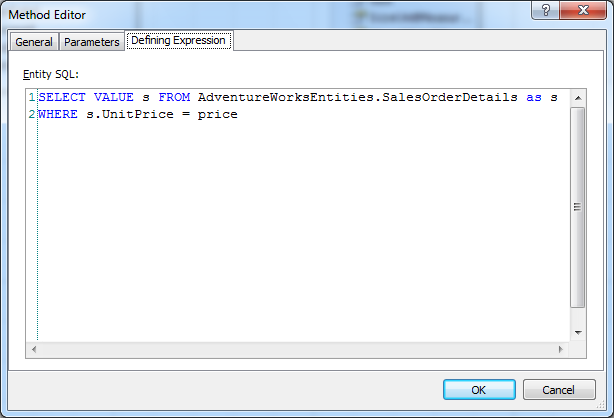This topic demonstrates how to create a model-defined function returning a scalar result. It uses the SalesOrderDetail entity, generated from the Sales.SalesOrderDetails table in the Microsoft standard AdventureWorks database. The function will return a collection of the SalesOrderDetails entities having the specified price. The following walkthrough assumes that the entity is already created. You may simply generate a model from the NorthwindEF database for this walkrthrough.
To create such a model-defined function, returning a collection of entities, we perform the following actions:
| 1. | In the Model Explorer window right-click the Methods node and select New Method… in the shortcut menu. |
| 2. | Tweak the method as shown on the following screenshot: |

Note: The selected Collection Result check box means that the result of this method will be a collection IQueryable<SalesOrderDetail>, not a single SalesOrderDetail entity.
| 3. | Switch to the Parameters tab. Click the Add button to add a new parameter. |
| 4. | Specify all the settings for the new parameter as shown on the following screenshot: |

| 5. | Switch to the Defining Expression tab and enter the following code to the Entity SQL box: |
SELECT VALUE s FROM AdventureWorksEntities.SalesOrderDetails as s
WHERE s.UnitPrice = price

Note that parameter name is specified and used without any prefix like "@" or ":" on both Parameters tab and Defining Expression tab. Also it is necessary to use the context name as a prefix when referencing conceptual model objects in Entity SQL text.
| 6. | Click OK and save the model. If you are using the standalone version of Entity Developer, start the code generation by clicking the Generate Code button on the Model toolbar. |
The following code is generated in the .csdl mapping file:
<Function Name="GetSalesOrderDetailByPrice" ReturnType="Collection(AdventureWorks.SalesOrderDetail)">
<Parameter Name="price" Type="Decimal" />
<DefiningExpression>SELECT VALUE s FROM AdventureWorksEntities.SalesOrderDetails as s
WHERE s.UnitPrice = price</DefiningExpression>
</Function>
As a result of the code generation for the model, the corresponding context class method is generated:
C#:
[EdmFunction(@"AdventureWorks", @"GetSalesOrderDetailByPrice")]
public IQueryable<SalesOrderDetail> GetSalesOrderDetailByPrice (global::System.Nullable<decimal> price)
{
return this.QueryProvider.CreateQuery<SalesOrderDetail>(
Expression.Call(Expression.Constant(this),
(MethodInfo)MethodInfo.GetCurrentMethod(),
Expression.Constant(price, typeof(global::System.Nullable<decimal>)))
);
}
Visual Basic:
<EdmFunction("AdventureWorks", "GetSalesOrderDetailByPrice")> _
Public Function GetSalesOrderDetailByPrice (ByVal price As Global.System.Nullable(Of Decimal)) As IQueryable(Of SalesOrderDetail)
Return MyBase.QueryProvider.CreateQuery(Of SalesOrderDetail)( _
Expression.Call(Expression.Constant(Me), _
DirectCast(MethodBase.GetCurrentMethod, MethodInfo), _
New Expression() { Expression.Constant(price, GetType(Global.System.Nullable(Of Decimal))) }) _
)
End Function
Now it this method can be used in the application. For example:
C#:
using (AdventureWorksEntities context = new AdventureWorksEntities()) {
IList<SalesOrderDetail> orderDetailsByPrice = context.GetSalesOrderDetailByPrice(2024.9940M).ToList();
}
Visual Basic:
Using context As AdventureWorksEntities = New AdventureWorksEntities
Dim orderDetailsByPrice As List(Of SalesOrderDetail) = context.GetSalesOrderDetailByPrice(2024.994).ToList()
End Using